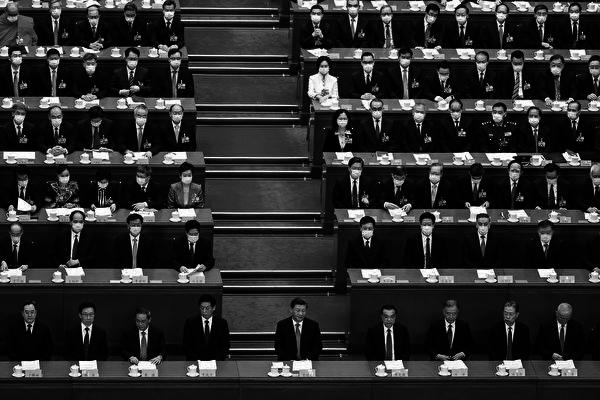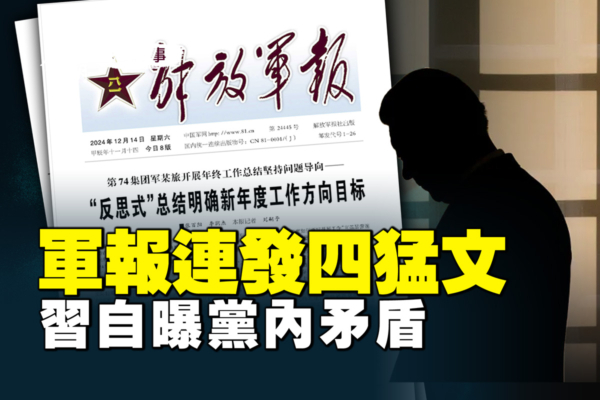A Scene from a CCP Meeting: The Chairperson on Stage Speaks in a Droning Buzz, Perfect for Helping Me Fall Asleep. (Guang Niu/Getty Images)
[People News] Recently, a young internet celebrity from Dalian, surnamed Li, has gained significant attention online. The incident began last December when a 37-year-old Ukrainian esports player, known online as 'Zeus', travelled to Shanghai for a competition. Li flew there to support him, and that night, they engaged in a sexual encounter. Following this, the Ukrainian man shared their private video with his fan base, leading to a rapid escalation of the situation. Mainland media and netizens harshly criticised her, labelling the Dalian girl as 'disgracing national dignity', and her university even considered expelling her. While the girl is indeed involved in moral and ethical issues, her actions pale in comparison to those of high-ranking officials within the Chinese Communist Party.
1. Evergrande's Hundred-Person Song and Dance Troupe Continues the Communist Party's History of Debauchery
After the arrest of Evergrande's boss Xu Jiayin in 2023, more secrets about him, his family, and the Evergrande Group have been revealed, including a song and dance troupe with over a hundred members, filled with beautiful women. By relying on these women for drinking, dancing, sex, and entertainment, how many Communist Party officials and financial executives did Xu manage to seduce? If these details were to come to light, it would certainly rival the scandal of Jeffrey Epstein in the United States.
Xu's public relations strategies may appear distinctive, but they are fundamentally no different from the sensational cases of the 'Dalian Female Police Officer' and the 'Xiamen Little Red Building'. The reason why figures like Xu Jiayin, Bo Xilai, and Lai Changxing are so skilled in this regard is straightforward—since the Yan'an period, the Communist Party has implemented a system of 'beautiful women accompanying high officials', a model that has intensified since the Party came to power, gradually spreading from the core leadership to society at large.
Zhu Hongzhao from the mainland has authored a book titled "The History of Daily Life in Yan'an." In this work, he notes that between 1937 and 1942, social dancing gained popularity in Yan'an, with many high-ranking officials of the Communist Party of China, including Mao Zedong and Zhou Enlai, showing a keen interest in dancing.
The art of social dance was initially imparted by American leftist journalist Shumate Lai. Mao Zedong's translator and secretary, Wu Lili, who bore a resemblance to the actress Da S, along with the pioneering 'literary star' Ding Ling, became renowned 'social butterflies' in Yan'an, receiving 'warm receptions and enthusiastic welcomes' wherever they went. These women not only exuded exceptional charm but also had prior marital experiences; their perspectives were relatively liberal, and they did not conform to rigid personal styles.
2. The Elevation of Social Dancing to Revolutionary Heights
In her memoirs, American journalist Shumate Lai remarked: 'They were diligent and eager to learn, asking questions about everything, and were unafraid of losing face. Zhu De and I dispelled superstitions and revealed the scene of social dancing. Zhou Enlai then joined in, but he danced as if he were solving a math problem. Peng Dehuai preferred to observe from the sidelines and refused to dance even once. He Long joyfully danced to the music on the blue brick floor; he was the only one with a sense of rhythm among them. Among the women in Yan'an, I earned the infamous reputation of 'corrupting military conduct.' On one occasion, when Zhu De invited me to teach him to dance again, I surprisingly declined. He accused me of being timid, saying: 'I have battled feudalism for half my life, and I do not wish to give up now!' I had no choice but to stand up and dance with him once in the name of democracy.'
Men have a fondness for social dancing, but the 'revolutionary women' vehemently oppose it, claiming it 'threatens their sense of security.' How can the plain rural women compete with the glamorous socialites from the cities? They fear this could become a reality, leading to the emergence of 'wife swapping' in Yan'an.
During this period, Mao Zedong also became involved with actress Jiang Qing. Ironically, while both were in a moment of desperation, the Communist Party labelled one as 'the greatest revolutionary' and the other as 'the biggest counter-revolutionary.'
Why do female students prefer the local Communist Party uncles? The answer lies in the tense political climate; while the Kuomintang-controlled areas were embroiled in war, the Communist Party-ruled Shaanxi was enjoying a more stable life. They did not come for the revolution; they came to escape danger. Public evidence supports this claim. The Yasukuni Shrine in Japan records that during the eight years of the Anti-Japanese War, the Communist army killed 851 Japanese soldiers, while the Kuomintang killed 318,883, a fact inscribed on the wall.
3. The Continuation and Development of the Social Dance System
After the Communist Party took power in 1949, social dancing became popular in the 1950s and 1960s. While Communist Party officials proclaimed their commitment to 'serving the people,' they began to indulge in a more luxurious lifestyle, inviting younger and more attractive girls to dance with them at Zhongnanhai.
Hong Kong commentator Lin Baohua (林保華) reminisced: "In 1958, while studying at Renmin University of China in Beijing, I relocated from the city centre to the western suburbs. I noticed that every weekend evening, a group of beautiful female classmates would gather at the school gate. Some of them were from the military's art troupe and were picked up by a large bus. Other classmates told me that they were going to Zhongnanhai to dance with the leaders. These young women were characterised by their youth, beauty, political loyalty, and reliability, making them easy to mobilise—summoned at will and dismissed just as quickly."
The mainland magazine 'Global People' featured an article titled 'Looking at China in 70 Years | Chen Ailian (陳愛蓮), 70 Years on Tiptoes', which highlighted that Chen Ailian, who once served as the vice-chairman of the China Dancers Association, had been received multiple times by various leaders of the Communist Party of China. She performed for the 'central leaders' and even danced with Mao Zedong (毛澤東).
At just 15 years old, Meng Jinyun (孟錦雲), a dancer from the Air Force Song and Dance Troupe, became Mao's 'dedicated dance partner' after dancing with him, earning his special favour.
Zuo Dabin (左大玢), who portrayed Guanyin in 'Journey to the West', was first noticed by Mao at the age of 13 in 1956. By the age of 16, she was designated to dance with Mao every time he visited Changsha.
The 'Beijing News' reported on September 17, 2016, that national first-class actress Wang Xiaotang (王曉棠) began dancing with Zhou Enlai (周恩來) at the age of 18 in 1952.
In his book "Memoirs of Mao Zedong's Personal Doctor," Mao's personal physician Li Zhizui reveals that the dance party was organised for Mao to fulfil his personal desires, during which he exploited thousands of girls. Mao contracted a sexually transmitted disease but refused treatment, believing he could "collect yin to supplement yang" from young girls. When Li Zhizui suggested that Mao at least undergo local cleaning, Mao's response was blunt and grotesque: "There is no need for that; it can be cleaned on them." The girls who were exploited were subsequently sent secretly to remote mountains or islands to protect Mao's reputation.
4. The purpose of promiscuity is to lead people's souls to hell.
Following the so-called reform and opening up by the Chinese Communist Party (CCP), its scandalous history has continued without interruption, introducing new forms of exploitation: accompanying dances, sports, singing... This trend has permeated society.
The "Doctrine of the Mean" states: "The way of the gentleman begins with the husband and wife, and when it reaches its peak, it is observed in heaven and earth," highlighting the importance of family relationships. The CCP, which has roots in Satanism, is entirely disconnected from Chinese civilisation. The CCP cult seeks to destroy human culture and corrupt moral values through promiscuity, ultimately aiming to lead people's souls to ruin.
The female internet celebrity named Li, who has "dishonoured the national dignity," is simply a product of the CCP cult's influence. If this cult is not dismantled, the act of "dishonouring the national dignity" will become commonplace.
(First published by People News) △











News magazine bootstrap themes!
I like this themes, fast loading and look profesional
Thank you Carlos!
You're welcome!
Please support me with give positive rating!
Yes Sure!